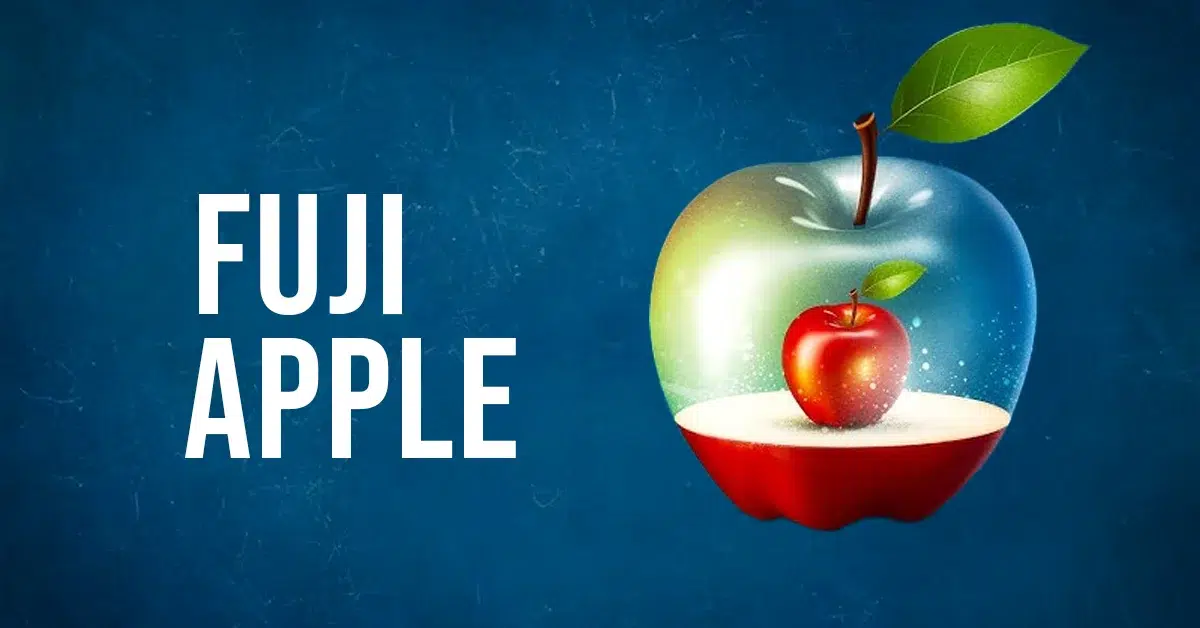The Fuji apple is one of the most popular apple varieties in the world, beloved for its sweet flavor, crisp texture, and versatility. Whether you enjoy it as a snack, use it in salads, or bake it into a delicious dessert, Fuji apples never disappoint. In this article, we’ll explore the origins, characteristics, health benefits, uses, and more about the Fuji apple, highlighting why it deserves a spot in your kitchen.
ALSO READ: Saying No For Mastery: The Key To Personal Empowerment
What Is A Fuji Apple?
The Fuji apple is a hybrid fruit that originated in Japan in the late 1930s. A cross between the Red Delicious and Ralls Janet apple varieties, the Fuji apple was developed with the goal of producing a fruit that combines the best qualities of both parents—namely, the sweetness of Red Delicious and the firm texture of Ralls Janet. It was first introduced to the market in Japan in the 1960s and has since gained international popularity.
Origins of the Fuji Apple
The Fuji apple was named after Mount Fuji in Japan, symbolizing the apple’s high quality and exceptional taste. Japanese scientists developed the apple to thrive in the country’s unique climate and soil, and it quickly became a staple in Japanese households. However, the fruit’s exceptional flavor and texture soon garnered global attention, and it spread to countries around the world, including the United States.
Today, Fuji apples are widely grown in various regions, including the Pacific Northwest in the U.S., and are considered one of the top-selling apple varieties globally.
Characteristics Of Fuji Apples
Fuji apples are easily recognizable due to their distinct appearance and taste. Here are some key characteristics that set them apart:
Flavor
Fuji apples are known for their intense sweetness. With a perfect balance of sugar and acidity, they are often described as one of the sweetest apple varieties. They have a subtle, honey-like flavor with hints of floral notes, making them a delight to bite into.
Texture
Fuji apples are incredibly crisp and firm, offering a satisfying crunch with every bite. Their flesh is dense, which makes them an excellent choice for both eating raw and cooking.
Appearance
The Fuji apple has a distinctive red and yellow color, often with a pinkish blush. The skin is slightly thick, which helps protect the fruit and contributes to its shelf life. The apples are medium to large in size, making them perfect for snacking.
Juiciness
Fuji apples are known for their juiciness. When you take a bite, the apple releases a burst of refreshing juice that adds to its enjoyable texture.
Health Benefits Of Fuji Apples
Like all apples, Fuji apples offer a variety of health benefits. They are packed with essential nutrients that can support overall wellness. Here’s why Fuji apples are good for you:
Rich in Fiber
One of the standout benefits of Fuji apples is their high fiber content. An average-sized Fuji apple contains about 4 grams of dietary fiber, which is crucial for digestive health. Fiber helps regulate bowel movements, supports gut health, and aids in controlling blood sugar levels. Additionally, fiber contributes to satiety, helping you feel full and satisfied after a snack.
Packed with Antioxidants
Fuji apples are rich in antioxidants, which help protect the body from free radicals and oxidative stress. These antioxidants play a role in reducing inflammation, lowering the risk of chronic diseases, and supporting overall immune health. Apples, including Fuji apples, are a good source of vitamin C, which is essential for a healthy immune system.
Low in Calories
Fuji apples are a low-calorie snack, with an average-sized apple containing around 80-100 calories. This makes them an excellent choice for those looking to maintain or lose weight, as they provide a satisfying and healthy option without excessive calorie intake.
Promotes Heart Health
The fiber, antioxidants, and potassium in Fuji apples can all contribute to improved heart health. Potassium helps regulate blood pressure, while fiber lowers cholesterol levels, both of which reduce the risk of cardiovascular disease. The antioxidants in Fuji apples also protect the heart by reducing oxidative stress and inflammation.
Improves Hydration
Fuji apples are composed mostly of water, with an average of 85% water content. Eating these apples can help keep you hydrated, which is essential for maintaining healthy skin, muscles, and overall bodily function.
Culinary Uses Of Fuji Apples
Fuji apples are incredibly versatile and can be used in a wide variety of culinary applications. Here are some of the best ways to enjoy Fuji apples:
Fresh Eating
The simplest and most popular way to enjoy Fuji apples is to eat them fresh. Their sweetness and crispness make them perfect for snacking. They can also be paired with nut butters, such as almond or peanut butter, for an extra boost of protein and flavor.
Salads
Fuji apples add a delightful crunch and sweetness to salads. Slice them thinly and toss them with greens like spinach or arugula, along with nuts, cheese, and a tangy vinaigrette for a refreshing and satisfying meal.
Baking
Due to their firmness, Fuji apples are excellent for baking. They hold their shape well and do not turn mushy, making them ideal for pies, tarts, crisps, and cakes. The sweet flavor of Fuji apples pairs wonderfully with cinnamon, nutmeg, and other warm spices.
Smoothies
Fuji apples make a great base for smoothies. Their natural sweetness can eliminate the need for added sugars or sweeteners, and their juiciness helps create a smooth, refreshing drink. Pair Fuji apples with spinach, bananas, or berries for a healthy and delicious smoothie.
Apple Sauce
Another great way to enjoy Fuji apples is by turning them into homemade apple sauce. Simply cook them down with a bit of sugar and cinnamon for a flavorful side dish or topping for oatmeal and yogurt.
Storing And Selecting Fuji Apples
To get the most out of your Fuji apples, proper storage and selection are important:
How to Select Fuji Apples
When selecting Fuji apples, look for fruit that is firm and free from blemishes or soft spots. The skin should be vibrant in color, with a mix of red and yellow tones. The apples should feel heavy for their size, which indicates that they are full of juice.
How to Store Fuji Apples
Fuji apples should be stored in a cool, dry place. If you plan to store them for a longer period, keep them in the fridge to extend their freshness. Fuji apples can typically last up to a few weeks when stored in a cool environment. Make sure they are not stored next to other fruits like bananas, which release ethylene gas and can cause apples to ripen too quickly.
Why Choose Fuji Apples?
With so many apple varieties available, it’s natural to wonder what sets Fuji apples apart. Here are a few reasons why Fuji apples are an excellent choice:
Sweetness: Fuji apples are among the sweetest apple varieties, making them an excellent choice for people who prefer sweet fruit.
Crunch and Firmness: The crisp, firm texture of Fuji apples makes them perfect for snacking or using in recipes that require a more substantial apple.
Versatility: Fuji apples can be used in a wide variety of culinary applications, from fresh snacking to cooking and baking.
Health Benefits: With a wealth of fiber, antioxidants, and vitamins, Fuji apples offer several health benefits, including supporting digestion and heart health.
ALSO READ: Business In Street Tee Font: Perfect For Urban-Inspired Branding
FAQs
What is a Fuji apple?
A Fuji apple is a hybrid apple variety developed in Japan in the 1930s. It is a cross between the Red Delicious and Ralls Janet apple varieties. Known for its sweetness, crisp texture, and juicy flesh, Fuji apples are one of the most popular apple varieties globally.
Are Fuji apples good for baking?
Yes, Fuji apples are excellent for baking. Due to their firm texture and natural sweetness, they hold up well in pies, tarts, and other baked goods without turning mushy.
How do I store Fuji apples?
Fuji apples should be stored in a cool, dry place. To extend their freshness, store them in the refrigerator. Avoid storing apples next to ethylene-producing fruits like bananas, as they can cause the apples to ripen too quickly.
Are Fuji apples healthy?
Yes, Fuji apples are very healthy. They are low in calories, rich in fiber, antioxidants, and vitamin C, and provide several health benefits, including supporting digestion, heart health, and hydration.
How can I use Fuji apples in salads?
Fuji apples can be sliced thinly and added to salads for a crunchy, sweet element. They pair well with greens like spinach and arugula, nuts, cheese, and vinaigrette dressings.
In conclusion, the Fuji apple is more than just a delicious snack—it’s a nutritious fruit that can enhance a variety of dishes. Whether you’re looking to improve your health or add a sweet, crunchy element to your meals, Fuji apples are a versatile and flavorful choice.










